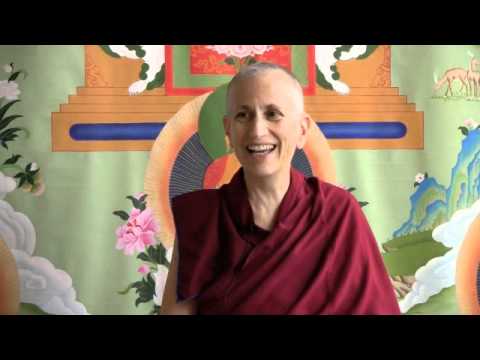The elephant of ignorance
A Crown Ornament for the Wise, a hymn to Tara composed by the First Dalai Lama, requests protection from the eight dangers. These talks were given after the White Tara Winter Retreat at Sravasti Abbey in 2011.
- Two kinds of ignorance: ignorance of ultimate truth and ignorance of cause and effect
- How intoxication with sense pleasures leads one to be unaware of the results of actions
- Whether we’re intoxicated with drugs or liquor or intoxicated by ignorance, the results are the same
The Eight Dangers 05: The elephant of ignorance (download)
W finished the verse on anger. We’re going to go back to the second verse, which was ignorance, which says:
Not tamed by the sharp hooks of mindfulness and introspective awareness,
Dulled by the maddening liquor of sensual pleasures,
It enters wrong paths and shows its harmful tusks:
The elephant of ignorance—please protect us from this danger!
When you have a crazy elephant—a mad elephant—they terrorize the whole community. They’re just out of control. They don’t know what they’re doing. Sometimes, in South India, where I was, near the monasteries, sometimes there are still elephants in the jungle around there, and occasionally they have a wild elephant and everybody goes and hides.
“Not tamed by the sharp hooks of mindfulness and introspective awareness.” Mindfulness remembers our precepts, remembers our values and principals. Introspective awareness checks up and sees what’s going on in our mind and if we’re living according to our precepts and our values and principals. And so they act like a hook. You know when our mind is like flying over the universe with its attachment and anger and jealousy and arrogance and everything, if we have mindfulness and introspective awareness they hook the mind back and, “Okay, come on back here, come on back to a virtuous state.” So that’s the analogy with the hook.
But when the mind is not tamed by that hook; and it, in addition, is “dulled by the maddening liquor of sensual pleasures.” So, if you take just regular intoxicants and liquor—and we’ve all been intoxicated, know how we behave, what that does to our mind—and we are definitely quite maddened by it. Totally out of control, do things, say things, think things that we would never do in our normal state of mind. When we’re intoxicated with sense pleasures in that same kind of ignorant way. Because the intoxicants make our mind ignorant.
There are many kinds of ignorance, but there are two principal kinds: the ignorance of the ultimate nature, the ignorance of cause and effect. Here it’s referring particularly to the ignorance of cause and effect, where we don’t know what we’re doing. We have no understanding of karma and its effects. No mindfulness or our precepts or of the ten virtuous actions. No introspective alertness that is aware of what we’re doing and thinking and saying and so forth. And instead the mind is just off chasing after sense pleasure. Not thinking about what kind of results this is going to bring to me. We all know the results from that, don’t we?
And somebody said in one of our conversations: “I’d wake up on a couch and say, “Oh, I think I’ll get dressed now.” [laughter] You know? Or wake up on a couch and say, “Whose couch is this anyway?” And, “What did I do last night? I can’t even remember.” So, that’s just ignorance at its prime. And, you know, because of chasing after sense pleasure.
Whether we’re intoxicated with liquor and drugs when we chase after sense pleasure, or just intoxicated by our ignorance, it doesn’t matter. The results are the same. We wind up in big messes.
Think about that a little bit. Do some research on your life and trace back what’s happened when you’ve been plain old intoxicated and then when you’ve been so involved in sensual pleasures that you’re not thinking of the results of your actions—either short term or long term. And so getting ourselves into messes this life, creating unbelievable karma that will ripen in future lives.
That’s the first step. Let’s do a little check, you know, of looking back at our lives and doing some evaluation. And then this will help us see and think about where we want to go from here in the future.
Venerable Thubten Chodron
Venerable Chodron emphasizes the practical application of Buddha’s teachings in our daily lives and is especially skilled at explaining them in ways easily understood and practiced by Westerners. She is well known for her warm, humorous, and lucid teachings. She was ordained as a Buddhist nun in 1977 by Kyabje Ling Rinpoche in Dharamsala, India, and in 1986 she received bhikshuni (full) ordination in Taiwan. Read her full bio.


